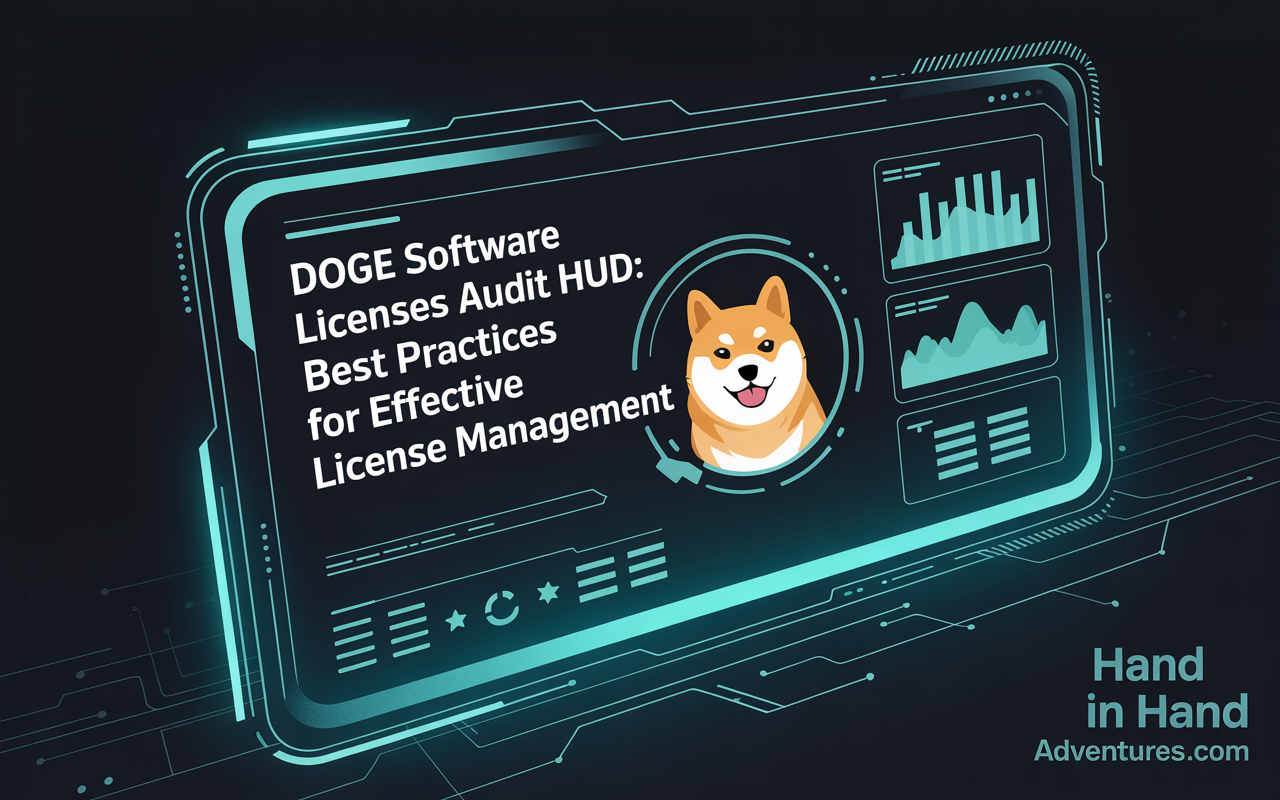Navigating the world of software licenses can often feel like walking a tightrope. One misstep, and businesses risk costly penalties or even legal troubles. This is where Doge Software Licenses Audit HUD comes into play—a powerful tool designed to streamline license management and ensure compliance with ease.
Understanding your software licenses isn’t just about avoiding pitfalls; it’s about maximizing resources, enhancing productivity, and maintaining a competitive edge. With technology evolving at breakneck speed, effective license management has never been more crucial for organizations of all sizes.
Let’s dive in and explore the nuances of this essential process while uncovering best practices that can help transform how you manage your software assets using Doge Software Licenses Audit HUD.
Understanding the Importance of License Management
License management is more than just a legal necessity. It plays a crucial role in ensuring that businesses operate smoothly and efficiently. With software becoming an integral part of daily operations, managing those licenses effectively can safeguard against unexpected costs.
Compliance with licensing agreements protects organizations from potential legal issues. Without proper management, companies risk hefty fines or even litigation for using unlicensed software.
Additionally, license management helps optimize spending. By tracking what you have and where it’s being used, resources can be allocated more wisely. This not only saves money but also enhances productivity across teams.
Furthermore, it fosters an environment of accountability within the organization. Employees become aware of compliance standards and the importance of adhering to them when they understand the overall impact on business operations.
Common Challenges in License Management
Managing software licenses comes with its own set of hurdles. One significant challenge is the lack of visibility into license usage. Many companies struggle to track how many licenses are in use versus what they’ve purchased.
Another common issue is compliance risks. Failing to adhere to licensing agreements can lead to hefty fines and legal troubles, yet many organizations overlook this critical aspect until it’s too late.
Budget constraints often complicate matters further. Companies may not allocate enough resources for proper license management, leading to inefficiencies and potential overspending on unnecessary licenses.
Additionally, the rapid pace of technology changes means that keeping up with evolving licensing models can be daunting. Organizations must continuously adapt their strategies as new software solutions emerge and existing ones phase out or change terms.
These challenges highlight the need for a proactive approach in managing software licenses effectively.
Best Practices for Effective License Management:
Conducting regular audits is essential for effective license management. Frequent assessments help identify compliance issues and ensure that your software usage aligns with licensing agreements. This proactive approach can prevent costly penalties down the road.
Accurate record-keeping cannot be overlooked. Maintain detailed logs of all software licenses, including purchase dates and expiration terms. This transparency aids in tracking renewals and ensures you never lose sight of essential documentation.
Automated tools streamline the entire process, making it easier to monitor licenses across various departments. These solutions often provide real-time insights into usage patterns, helping teams manage their resources more efficiently.
Training employees on license compliance fosters a culture of accountability within the organization. Regular workshops or informational sessions can clarify expectations and responsibilities related to software use, minimizing potential risks associated with non-compliance.
A. Conduct Regular Audits
Regular audits are essential for effective license management. They help organizations identify compliance gaps and optimize software usage. By performing these audits frequently, companies can ensure they are not overspending on unused licenses.
Audits also keep track of software installations across all devices. This oversight prevents unauthorized use and highlights any discrepancies in licensing agreements. With accurate data at hand, businesses can make informed decisions about their software needs.
Establishing a schedule for regular audits fosters a proactive approach to license management. It encourages accountability within teams and reinforces the importance of adherence to licensing terms.
Engaging with stakeholders during the audit process promotes transparency and collaboration, enhancing overall compliance efforts throughout the organization.
B. Keep Accurate Records
Keeping accurate records is crucial for effective license management. It creates a solid foundation for tracking all software licenses in use within your organization.
Start by documenting essential details such as purchase dates, renewal timelines, and the number of licenses acquired. This information will help you stay ahead of compliance requirements.
Organizing records systematically can streamline audits. Use spreadsheets or dedicated software to categorize your data efficiently. Make sure everything is easily accessible for quick reference during reviews.
Regularly updating these records ensures they remain relevant. As software usage evolves, so do licensing needs. Keeping tabs on any changes allows you to adjust accordingly without scrambling at the last minute.
Ensure that someone in your team takes ownership of record-keeping responsibilities. A designated individual helps maintain accountability and consistency across the board.
C. Utilize Automated Tools
Automated tools are game-changers in license management. They streamline processes and minimize human error, making compliance easier.
These solutions can track software usage in real-time. This ensures that your organization stays within the bounds of its licenses while optimizing resource allocation.
With automated alerts, you’ll receive notifications about upcoming renewals or expirations. This proactive approach helps avoid costly penalties associated with non-compliance.
Additionally, many of these tools offer reporting features. You can generate insights into license utilization and identify underused software, allowing for informed decisions on renewals or cancellations.
Investing in automation saves time and resources. Your team can focus on strategic initiatives rather than getting bogged down by manual tracking tasks.
Using automated tools not only improves efficiency but also enhances overall accountability within your organization’s licensing practices.
D. Train Employees on License Compliance
Training employees on license compliance is crucial for any organization. When staff understands the importance of adhering to software licenses, they are more likely to follow guidelines.
Regular workshops can be beneficial in this regard. These sessions should cover the specifics of what licenses entail and the consequences of non-compliance. Engaging presentations will capture attention and drive home key points.
Interactive training modules can also enhance understanding. Quizzes or scenario-based learning allow employees to apply their knowledge practically. This hands-on approach reinforces concepts effectively.
Additionally, creating an open atmosphere for questions encourages dialogue about concerns regarding software use. Employees should feel comfortable discussing issues without fear of reprimand.
Establishing a culture that prioritizes compliance not only protects your organization but also fosters accountability among team members regarding software usage.
Case Studies: Companies that Successfully Managed their Licenses with Doge Software Audit HUD
Company A, a mid-sized tech firm, faced consistent issues with software compliance. They implemented the Doge Software Licenses Audit HUD and noticed significant improvements almost immediately. Regular audits allowed them to identify unused licenses that were previously overlooked, saving them money.
Meanwhile, Company B—a large corporation—struggled with tracking their vast array of licenses across multiple locations. With the help of Doge’s automated tools, they streamlined license management processes. This led to a reduction in compliance risks and increased efficiency.
A small startup utilized Doge Software’s features to train its team on proper license usage. By fostering awareness among employees about compliance responsibilities, they built a culture of accountability that transformed their licensing practices for good.
These real-world examples illustrate how effective use of the Doge Software Licenses Audit HUD can optimize license management strategies across various business sizes and sectors.
The Impact of Effective License Management on Business
Effective license management is crucial for any business that relies on software. The Doge Software Licenses Audit HUD provides organizations with the tools they need to stay compliant and avoid costly penalties. By implementing best practices, companies can streamline their processes, reduce risks, and ultimately boost productivity.
When businesses prioritize regular audits, maintain accurate records, utilize automated tools, and train employees on compliance protocols, they create a culture of accountability. This not only protects against legal issues but also enhances overall operational efficiency.
The success stories of companies leveraging the Doge Software Licenses Audit HUD illustrate the tangible benefits of effective license management. These organizations have seen improvements in cost savings, resource allocation, and employee engagement as a result of adopting robust licensing practices.
Embracing effective license management empowers businesses to focus more on growth and innovation while minimizing potential setbacks associated with non-compliance. It’s an investment in stability that pays off over time.

